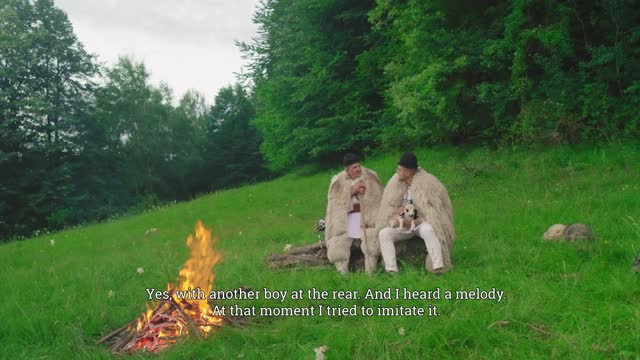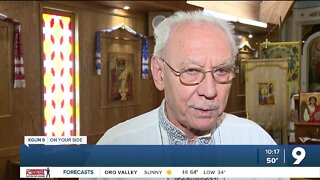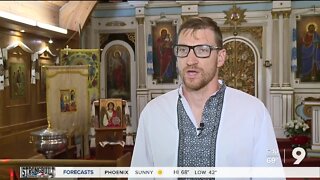Premium Only Content

The Lives & Songs of our Shepherd Ancestors - Nicolae Sanda & Dan Panu-Misailescu Interview
The transcript: D)When you went with the sheep, the shepherd was leading the flock while playing this “jiana” and the sheep were following him. Is that so?
N)Yes!
D)Can you please tell us a little bit about how it was?
N)Well, that’s how it was approximately 50 years ago
D)How old were you back then?
N)Well, I was 30. Now I'm 80.
D)And where were you back then? On what mountains?
NC)From the Olteț river uphill through the mountains towards Negovanu
D)You!
N)The man with the flock of sheep!
D)Aha, so you were with another flock?
N)Yes, with another boy at the rear. And I heard a melody.At that moment I tried to imitate it. When we got uphill to our sheepfold, someone asked me, “Did you memorize that whistle tune that the other shepherd was playing?”
I said, “I remember some”
He said, “Play!”
And I played it.
And from then on, that’s how it’s been.
And then I taught others, then others, then others, and it continues to exist to this day
D)The shepherd was playing the whistle while leading the flock of sheep
N)Yes, and he was old,very old
D)And the sheep were following him
N)Yes, that’s how it’s done.
One shepherd leads the flock of sheep, and the other accompanies the rear.
That’s the way the story goes
D)That’s very beautiful!
N)Nec plus ultra!
D)And you taught me this jiana 50 years later.
(The jiana is a Romanian traditional music genre)
N)Yes, about 50 years
D)Thank you, it is very beautiful!
N)I would say the same but it isn’t sung anymore,there weren’t people interested in learning it.
And because you were interested in it,you learned it
D)I am! I am a programmer (software engineer) but I love folklore!
N)That’s very good! I’m glad!
D)And nature in general!
N)I’m glad that folklore is being passed on and it is not forgotten!There are many things that have been forgotten.But now let’s hope it will continue! It must continue!
D)And that’s exactly why I’m thanking you for coming with us to the studio, recording, and filming these last few days.I know it’s been hard for you but this is how folklore is carried on not just for us, but for Iulia, for the children and the children’s children and so on
N)For the youth, yes!This is something interesting.We try to preserve what we can preserve
D)These are treasures and it would be a shame to be forgotten
N)Yes!
D)But they won’t be forgotten!
N)They won’t be forgotten! In a way, you saw that when we went to the studio, mister Parnica was interested in the melody
D)Yes, he recognized the authentic folklore and appreciated it
N)Yes, he appreciated it
D)Even more so because you are 80 years old! Many years ahead!
N)The same to you!
D)He appreciated it even more when he heard you playing!
[...]
N)As Nicușor also knows, Balota was a place where people from both the villages of Racovița and Vaideeni went with their sheep.
Dumitru lu’ Glăjoi gave me his sheep and said,
“Can you please come and help me when I go with my sheep on the mountain? I will pay for your worked days”
D)Ok
N)And I went to climb the mountain where I stayed for a week,until they organized themselves at the sheepfold
D)Yes
N)And a boy from Vaideeni village, older than me, would set out uphill every morning on a trail from the sheepfold and would always play this “învârtita” on the whistle.The tune delighted me,so I memorized it! It is something very… meaningful!
D)The “învârtita” is very beautiful indeed!
N)It has a lot of meaning!
D)And how old were you back then, when you learned the învârtita?
N)The “învârtita”,when I was 20 years old
D)Aha, so you were younger than when you learned the jiana
N)I was younger, I was almost 20 years old. After that I was drafted in the army. I was actually about 19 years old
D)And the shepherd that you heard the “învârtita” from was as old as the shepherd that you heard the “jiana” from?
N)No, no, the shepherd was younger
D)So he was younger
N)The shepherd was younger. He didn't talk much. If you asked him something he would answer. If not, no!
D)I understand he was speaking through his whistle
N)Yes. He spoke often through his whistle!
D)Yes!
N)That’s where I grasped it, where I learned it
D) He was playing at campfires in the evenings or…?
N)When he set off in the mornings
D)When he set off with the sheep in the mornings,he would lead the flock and play the whistle
N)He took his whistle and it was as if the sheep also knew. They would follow him. It was very interesting
D)I see
N)And this I know from back then
Well, you saw that I also know many other whistle melodies
D)That’s true!
N)But I remember these most
I really liked these two melodies that we just played
D)Yes, I noticed
N)And with mister Parnica
D)Yes, mister Parnica made an exceptional orchestration
N)Yes, it delighted me!
D)That’s right! I’m glad you like it and I thank you once again for teaching me these very beautiful melodies! Romanian authentic folklore,Romanian traditional culture from our ancestors!
NC)And from the region!
D)Yes, from our region of Polovragi!
NC)Yes!
Good, we can go now
D)Yes
-
 0:52
0:52
KGUN
3 years agoUKRAINE INTERVIEW
138 -
 0:38
0:38
KGUN
3 years agoUKRAINE INTERVIEW 2
43 -
 3:27
3:27
Goodbye, Elaine
3 years agoRadio Interview
47 -
 0:09
0:09
gerlachfam
3 years agoWillow, our German Shepherd, howling @ the siren
38 -
 LIVE
LIVE
SpartakusLIVE
6 hours ago$1,000 Pistol Challenge || #1 ENTERTAINER of The EONS Eradicates BOREDOM
1,050 watching -
 2:33:37
2:33:37
TimcastIRL
3 hours agoTrump Orders Review of Smithsonian For Being Woke & Out of Control | Timcast IRL
116K38 -
 3:09:10
3:09:10
Barry Cunningham
6 hours agoPRESIDENT TRUMP HAS TAKEN THE MONSTER AWAY FROM THE LEFT! HORROR STORIES WON'T WORK ANYMORE!
48.4K53 -
 LIVE
LIVE
WickedVirtue
1 hour agoLate Night Fortnite w/ Friends
227 watching -
 LIVE
LIVE
This is the Ray Gaming
1 hour agoCould you be? Would you be? Won't you be my RAYBOR? | Rumble Premium Creator
44 watching -
 1:46:52
1:46:52
JahBlessGames
2 hours ago🎉Come een' and come tru' - VIBES | MUSIC | GAMES
1.44K